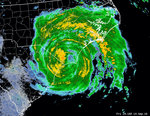

As hurricane season continues, Chatham County’s Emergency Management staff is putting the finishing touches on its preparation: updating resource inventory, reviewing sheltering plans and testing call-out emergency communications systems.
It’s just in time, too, with Tropical Storm Elsa expected to move over North Carolina with heavy rains later this week.
“Usually several months out is just a good opportunity for us to get the team together to talk through our planning standards and our general strategies and approaches, if there’s anything that’s changed that doesn’t allow for that normal production,” Steve Newton, director of Chatham’s Emergency Management, told the News + Record. “So we’ve been doing that for a couple months now. In fact, we just finished up.”
This year, as was the case last hurricane season, the county is anticipating needs specifically imposed by the COVID-19 pandemic. While vaccination rates and lower case counts in Chatham are encouraging, Newton said the pandemic “still is a very real concern in the community.”
When it comes to hurricane preparedness, one element the department focused on was sheltering. Typically, the county has several shelter locations — some in trailers or schools — for families or people whose homes are damaged in a storm, or for people without a safe place to stay during the storm. This year, sheltering is complicated, thanks to the remaining threat of catching or spreading COVID-19.
“Our approach to sheltering — we’re just trying to stress family preparedness and having a plan other than coming to a shelter, if at all possible,” Newton said. “Then for our shelters themselves, having to incorporate an isolation area and screening and stuff that we normally would not do as part of the registration and daily approach to sheltering.”
Emergency Management’s basic plan for operations includes preparedness, response, recovery and mitigation. The county manager, Dan LaMontagne, mandates the development and annual review of the plan by involved officials, according to the online document.
“Each agency of local government is responsible for the development of standard operating procedures in the support of this plan,” the document reads. “... This plan shall be exercised annually in lieu of actual response to real emergency events.”
Community Emergency Response Team (CERT), a part of Emergency Management, specifically focuses on educating people about disaster preparedness, including hurricanes. CERT presented on the county’s long- and short-term hurricane preparation at its April 28 meeting.
CERT also warned against dependence on county shelters, saying they tend to be crowded, noisy and offer minimum support. Instead, the presentation encouraged residents to plan ahead by making their own hurricane plan, developing a preparedness kit and staying informed. One way residents can do so is by registering for Chatham Emergency Operations’ alert systems — ALERT Chatham, SAFE Chatham and READY Chatham — on its website.
Chatham Emergency Management maintains and tests the county’s alert system, but Newton said the manager’s office uses it to send communication in case of a storm.
Those alert systems allow residents who are signed up to receive notifications via phone calls, text messaging, email and more, based on what they opt into. The alert system does not have an option on its sign-up page to opt into Spanish updates, and the information about the systems are in English. More than 12% of Chatham’s population is Hispanic or Latino. Newton said residents can change Wireless Emegency Alerts (WEA) from the National Weather Service in Raleigh to Spanish, but local warning messaging is primarily available in English.
“Warnings in Spanish require a bilingual person to translate and record a single message in both English and Spanish,” Newton said. “If they are not immediately available, the warning message is broadcast in English and we will evaluate the need to resend the message in other languages.”
In the past, local organizations such as the Hispanic Liasion spread information about approaching hurricanes and resources in Spanish through messaging and its Facebook page. While not local to Chatham specifically, Prepárate NC — a new project from Enlace Latino NC — provides information about hurricanes for free at its website, https://preparatenc.com/. Newton spoke to the importance of work done by groups such as the Hispanic Liaison.
“We lean on our County departments and non-government organizations that routinely serve Spanish-speaking residents to support us with translations and distributing notices and warnings through their established communities,” he said. “The Hispanic Liaison (https://hispanicliaison.org/) routinely shares disaster and recovery information on their social media pages.”
Newton added that, in the past, CERT had Spanish-language materials available at its recruiting booths, as well as "simply Spanish-English emergency translation boards."
"One of our CERT volunteers is fluent in Spanish and has offered to translate whenever needed," he said. "We also have Spanish-language CERT basic course training manuals."
Flooding is a big problem in many parts of Chatham, so Newton said the department has worked to update response plans and to mitigate flooding in areas where it’s common by exploring erosion control and culvert systems.
As climate change contributes to and likely worsens heat waves and increases in storms, including hurricanes, Newton said the county is preparing for things like cooling centers — though for now, many local organizations and nonprofits, such as DSS and the Council on Aging, take the lead on distributing resources such as fans or air conditioning units. The organization also works closely with Chatham County Sherrif’s Office, Newton said.
“Now we’re well into hurricane season, but we still haven’t quite reached the peak for North Carolina,” Newton said. “... Now is absolutely the time for folks to consider the ‘what ifs’ for a hurricane or storm, anything else. If I had to leave, if I had to evacuate because of flooding, where would I go?
“Now’s the time to have those conversations. Now’s the time to prepare,” he said. “And something that we haven’t had in the past is, especially if you consider that you may be going to a congregate care shelter, now would be a great time to get your COVID vaccination. That’s just one more factor that we can take off the table and not have to worry about if you’re vaccinated.”
Reporter Hannah McClellan can be reached at hannah@chathamnr.com or on Twitter at @HannerMcClellan.